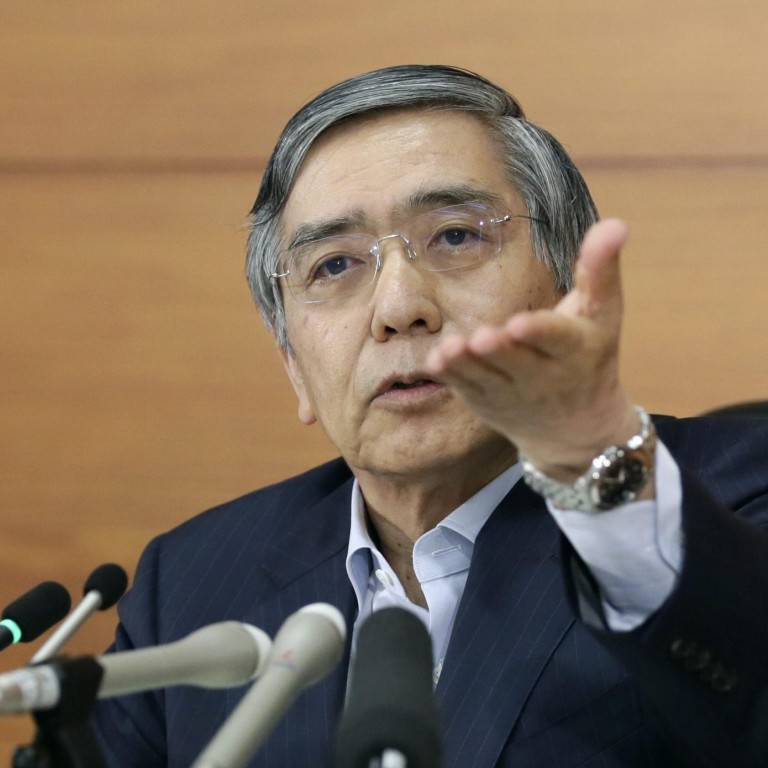
New | BOJ signals yen's slide may have gone too far
Asian economies are hoping Kuroda's comments will help reduce forex traders' expectations for further weakness in the Japanese currency
Asia must hope the yen's slide has been arrested even if Bank of Japan governor Haruhiko Kuroda has rowed back somewhat on recent comments that "even further declines on a real effective exchange rate basis are not likely to happen".
"If you look at the real effective exchange rate, it shows that the yen is already very weak," Kuroda said on June 10.
However, on June 16, he was drawing a distinction between the real effective exchange rate and the yen's nominal exchange rate, saying he was not making an assessment on the latter although also insisting "I didn't say I do not want a weak yen".
But of course, a weak yen does not necessarily mean a weaker yen.
It may well be that Japan's Ministry of Finance, which controls exchange rate policy, urged Kuroda to clarify his initial comments. Be that as it may, Kuroda, with his own background in the ministry, must have known the impact his initial comments would have had.
One explanation for the original statement, as some in Tokyo have privately suggested, might be that while the Bank of Japan currently is not envisaging further monetary easing, its future ability to do so - given that a weaker yen could be a side effect of such a move - could be constrained if the yen weakens further in the interim.
A cynic might think that, coming just a few days before a key congressional vote on the Trans-Pacific Partnership, a trade deal strongly supported by US President Barack Obama, Kuroda's comments might have been intended to placate wavering congressmen who had previously voiced disquiet about currency manipulation by would-be TPP members, including Japan.
Obama might have some claims on Japan's policymakers.
After all, on April 23, Obama reassured Japan that islands in the East China Sea, known as the Senkakus in Japan and the Diaoyus in China, where ownership is disputed by Beijing and Tokyo, were covered by the US-Japan security treaty.
It would suit China if Japan is seeking, however subtly, to reduce foreign-exchange traders' hopes for further yen weakness.
The yuan's own real effective exchange rate, as measured by the Bank for International Settlements, is elevated, driven largely by the weakness of the yen and the euro. If the yen's slide were to be arrested, it might facilitate a marginally weaker yuan on a real effective exchange rate basis.
That would be helpful when China is simultaneously managing its own economic slowdown, seeking to fend off deflation and pursuing the yuan's inclusion in the International Monetary Fund's special drawing rights basket, a move that would itself likely ignite new international demand for the currency.
In Seoul, policymakers would surely welcome any alleviation in the strength of the won against the yen, which has seen South Korea's exporters lose competitive advantage against their Japanese counterparts.
Trade ministry data issued this month showed Korea's exports in May suffered their worst annual drop for six years.
Combined with the negative economic impact of the Middle Eastern respiratory syndrome virus outbreak, it is perhaps no wonder the Bank of Korea cut interest rates to a record low of 1.5 per cent on June 11.
Any reining in of yen weakness against the won could only help the situation.
Elsewhere, Societe Generale recently highlighted how Taiwan, Thailand and Singapore were "suffering deepening consumer price index deflation", arguing "the emerging Asian region is suffering the pain of the yen falling at the same rapid pace it did from 1995 to mid-1997".
While Asia's economies are much healthier than in the late 1990s, a pause - or indeed a reverse - in the yen's slide would be beneficial to many.
On a practical level, trading the yen has sometimes been likened to playing golf, with the Ministry of Finance and the Bank of Japan indicating the best line and both institutions making some allowances for the yen to be hooked or sliced. Where the hook or slice takes the yen too far from their perceived best line, both parties alert players to get the ball back on the fairway.
Kuroda's comments on June 10, while "clarified" subsequently, might be a sign that Japan's policymakers feel there is a danger the yen is in the rough if not yet out of bounds and traders need to be guided back towards the fairway.

